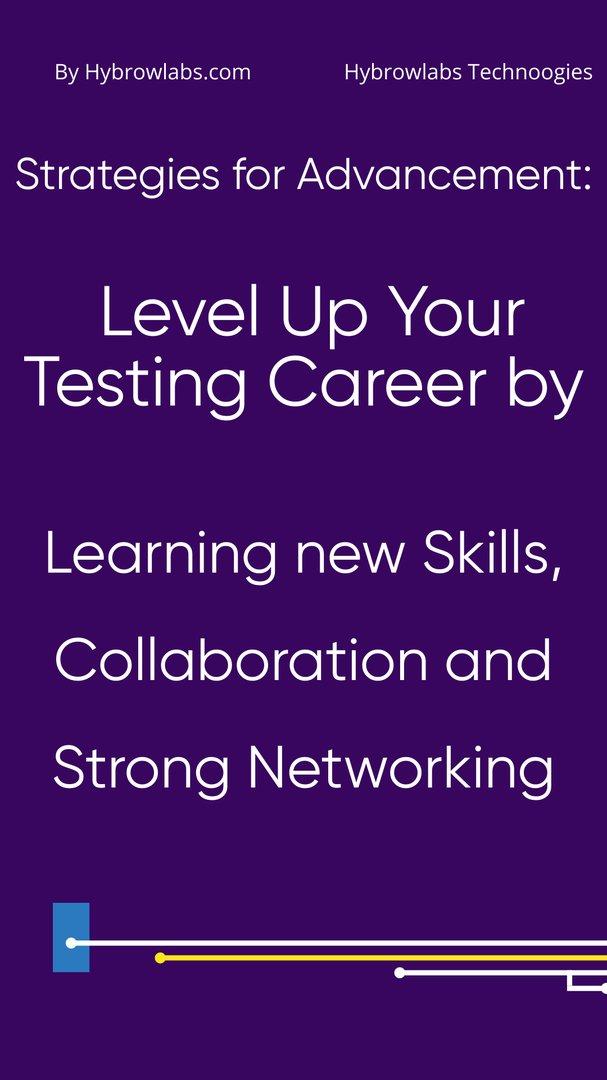
As a Quality Assurance professional, I can vouch that the testing career path is one filled with many opportunities, challenges, and exciting strategies for advancement. With the ever-evolving world of technology, the role of a tester has become more critical than ever before. Whether you are a seasoned professional or a newcomer to the field, navigating the testing career path can be a daunting task.
However, with the right mindset, tools, and strategies, you can navigate the path to success and make a significant impact in the software development industry.
In this article, we will explore the opportunities, challenges, and strategies for advancement in the testing career path. So, fasten your seatbelts and get ready to embark on a journey to success in the world of testing.
Stats to see the testing market moving forward:
In the past three years, the field of software testing has seen significant growth in opportunities and advancements in tools and trends. With the rise of agile development methodologies and the increasing demand for faster delivery of high-quality software, there has been a surge in the adoption of automation testing, DevOps, and continuous testing practices. According to a report by MarketsandMarkets, the global software testing market size is expected to grow from $26.41 billion in 2018 to $50.69 billion by 2023, at a Compound Annual Growth Rate (CAGR) of 13.0% during the forecast period.
Some of the popular tools and trends in software testing that have gained momentum in the last few years include AI-powered testing, test automation frameworks such as Selenium and Appium, cloud-based testing, and mobile testing. As per a report by Statista, the global market size of mobile testing was valued at $8.35 billion in 2019 and is expected to reach $20.77 billion by 2025, at a CAGR of 15.8% during the forecast period.
Let’s explore the opportunities in the Testing Career Path:

We all know that testing is a rapidly growing field, with many opportunities available for those interested in pursuing a career in this area. Some of the opportunities in the testing career path include:
1. Software Tester:
As a software tester, your primary responsibility is to test software products to ensure that they meet the requirements of users. You will work with developers and other members of the software development team to identify defects, report bugs, and help improve the quality of software products. Key skills would include
- Understanding of software testing techniques and methodologies
- Knowledge of different types of testing such as functional, integration, and regression testing
- Experience in creating test plans and test cases
- Familiarity with bug tracking and reporting tools such as JIRA
- Knowledge of programming languages like Java, Python, and C++
2. Quality Assurance Analyst:
As a Quality Assurance (QA) Analyst, you will be responsible for ensuring that the software products meet the standards and requirements of the organization. You will need to have the following skills to ensure that software products are of high quality and meet the needs of users.
- Knowledge of software quality assurance principles and processes like Functional and Interface specification,Conventions etc..
- Experience in creating test plans and test cases
- Familiarity with bug tracking and reporting tools like Jira
- Understanding of different types of testing such as functional, integration, and regression testing and when and where to use them for effectiveness.
3. Test Automation Engineer:
One of the most prominent roles that is gaining popularity is that of a Test Automation Engineer, and as same you will be responsible for developing and implementing automated test scripts to ensure the quality of software products.In this role the major responsibility is to work with developers and other members of the software development team to identify defects and ensure that they are addressed before software products are released. Key skills include
- Proficiency in automation testing tools such as Selenium, Appium, and JMeter
- Strong knowledge of scripting languages such as Python and JavaScript
- Experience in creating and executing automated test scripts
- Understanding of software development principles and practices
4. Performance Tester:
As a Performance Tester, you will be responsible for ensuring that software products perform well under different conditions. You will use tools to simulate different scenarios and identify potential performance issues before software products are released.
- Understanding of performance testing concepts and tools such as LoadRunner and JMeter
- Knowledge of server architecture and infrastructure
- Experience in creating and executing performance test scripts
- Strong sense and ability to analyze test results and identify performance issues
5. Security Tester:
As a Security Tester, you will be responsible for ensuring that software products are secure and free from vulnerabilities. You will identify security risks and work with developers and other members of the software development team to address these risks.
- Knowledge of security testing tools such as OWASP ZAP and Burp Suite
- Understanding of security testing methodologies and best practices
- Knowledge of web application architecture and security protocols such as SSL and TLS
- Experience in identifying and mitigating security vulnerabilities
Challenges one can face in the Testing Career Path:

While there are many opportunities available in the testing career path, there are also several challenges that you may face. Some of the challenges include:
1. Keeping up with new technologies:
Technology is rapidly changing, and as a tester, you need to stay up-to-date with new technologies to ensure that you are equipped with the skills and knowledge needed to test new software products.
2. Pressure to release software products quickly:
In today's fast-paced software development environment, there is often pressure to release software products quickly. As a tester, you may be required to test software products under tight deadlines, which can be challenging.
3. Working with developers who do not prioritize testing:
Some developers may not prioritize testing, which can make your job as a tester more challenging. You may need to advocate for the importance of testing and work with developers to ensure that they understand the value of testing.
4. Dealing with difficult stakeholders:
As a tester, you may need to deal with difficult stakeholders, such as project managers or clients, who may not understand the importance of testing or the time and resources required to ensure high-quality software products.
5. Limited career advancement opportunities:
In some organizations, there may be limited career advancement opportunities for testers, which can be frustrating if you are looking to advance your career.
With the above facts stated, we would also need to keep a plan ready which would not stop us from the growth we are wanting to achieve. So, let’s have a look at them
Strategies for Advancement in the Testing Career Path:

Despite the challenges, there are several strategies that you can use to advance your career in the testing career path. These include:
1. Develop your skills and knowledge:
To advance your career in the testing career path, it's essential to continue developing your skills and knowledge. Attend training sessions, take online courses, read books, and attend conferences to stay up-to-date with the latest testing techniques and technologies. This will ensure that you remain competitive and valuable to your organization.
2. Collaborate with other teams:
Collaborating with other teams, such as developers, project managers, and business analysts, can help you gain a deeper understanding of the software development process. This knowledge can be invaluable in identifying potential issues early in the development process, leading to higher quality software products.
3. Build a strong network:
Building a strong professional network can help you stay informed about job opportunities and industry trends. Attend industry events, join online testing communities, and connect with other testing professionals on social media platforms to build your network.
4. Insist and advocate for the importance of testing:
As a tester, you need to advocate for the importance of testing and work with developers and other stakeholders to ensure that testing is prioritized throughout the software development process. This can help ensure that high-quality software products are delivered to users.
5. Look for opportunities for advancement:
While there may be limited advancement opportunities for testers in some organizations, it's important to look for opportunities to advance your career. This may involve moving into a leadership role, specializing in a particular area of testing, or transitioning to a different role within the software development industry.
Conclusion:
Navigating the testing career path can be challenging, but with the right strategies, you can advance your career and become a valuable member of the software development team. Opportunities in testing are growing rapidly, and it's important to stay up-to-date with the latest technologies and techniques to remain competitive in the industry. Services like Hybrowlabs Development Service can provide valuable guidance and support for professionals in the testing field. Collaboration, networking, and advocacy for testing can also help ensure that high-quality software products are delivered to users, further enhancing your career prospects and contributions to the industry.
FAQs:
1.What skills do I need to succeed as a tester?
Strong analytical and problem-solving skills, attention to detail, excellent communication skills, and knowledge of testing techniques and tools are essential for success as a tester.
2.What are the most significant challenges facing testers today?
Keeping up with new technologies, pressure to release software products quickly, and dealing with difficult stakeholders are some of the most significant challenges facing testers today.
3.What is the career growth potential for testers?
In some organizations, there may be limited career advancement opportunities for testers. However, there are opportunities to specialize in a particular area of testing, move into a leadership role, or transition to a different role within the software development industry.
4.How can I stay up-to-date with the latest testing techniques and technologies?
Attend training sessions, take online courses, read books, attend conferences, and connect with other testing professionals to stay up-to-date with the latest testing techniques and technologies.
5.How can I advocate for the importance of testing?
Work with developers and other stakeholders to ensure that testing is prioritized throughout the software development process, and communicate the value of testing in delivering high-quality software products to users.






a3dc85.jpg)

.jpg)
fd8f11.png)


.jpg)
.jpg)